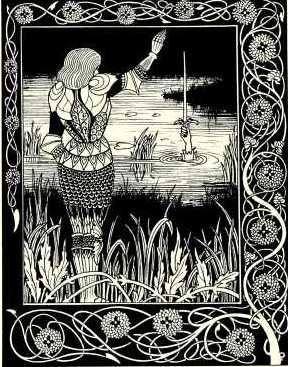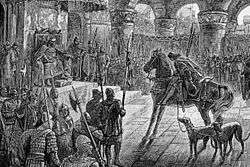Bedivere

In Arthurian legend, Sir Bedivere (/ˈbɛdᵻvɪər/ or /ˈbiːdᵻvɪər/; Welsh: Bedwyr; French: Bédoier, also spelt Bedevere) is the Knight of the Round Table who returns Excalibur to the Lady of the Lake. He serves as King Arthur's marshal and is frequently associated with Sir Kay. Sir Lucan is his brother and Sir Griflet is his cousin.
Role in Welsh tradition
Bedivere is one of the earliest characters to be associated with the Arthurian cycle, appearing in a number of early Welsh texts in which he is described as Bedwyr Bedrydant (Bedwyr of the Perfect Sinews), a handsome, one-handed knight under Arthur's command. His father is given as Pedrawd or Bedrawd, and his children as Amhren and Eneuawg, both members of Arthur's court.
One of the earliest direct references to Bedwyr can be found in the 10th century poem Pa Gur which recounts the exploits of a number of Arthur's knights, including Bedwyr, Cei and Manawydan. Of Bedwyr, the narrative says:
- They fell by the hundred
- before Bedwyr of the Perfect-Sinew.
- On the shores of Tryfrwyd
- fighting with Garwlwyd
- furious was his nature
- with sword and shield.[1]
A 9th-century version of The Stanzas of the Graves gives Bedwyr's final resting place on Tryfan hill.[1] In the Life of St. Cadoc (c.1100) Bedwyr is alongside Arthur and Cai in dealing with King Gwynllyw of Gwynllwg's abduction of St. Gwladys from her father's court in Brycheiniog. A possible allusion to Bedwyr could be found in the reference to Bedwyr's well in the 9th century Marwnad Cadwallon ap Cadfan. The Welsh Triads name Bedwyr as "Battle-Diademed", and a superior to Drystan, Hueil mab Caw and even Cei.[2]
A catchphrase often quipped by Cei, "by the hand of my friend" is likely a reference to Bedwyr's disability.[3]
The Winning of Olwen

Bedwyr is a prominent character in the tale of Culhwch and Olwen, in which he appears at the head of Arthur's court list with his friend Cei and is described as the handsomest man in the world (save for Arthur and Drych fab Cibddar), and the wielder of a magic lance.
He is called upon to accompany Culhwch on his quest to win Olwen's hand in marriage, and is the first knight to strike the giant Ysbaddaden with the poisioned spear meant for Culhwch. He goes on to assist Culhwch in completing the impossible tasks given to him by Ysbaddaden; he helps Cei and Goreu kill Wrnach the Giant, rescues Mabon ap Modron from his imprisonment, retrieves the hairs of Dillus the Bearded, captures the cauldron of Diwrnach during Arthur's attack on Ireland and takes part in the hunting of Twrch Trwyth with Arthur's dog Cavall at his side.
The tale ends with the completion of the tasks, the humiliation and murder of Ysbaddaden, and the marriage of Culhwch and Olwen.
Geoffrey of Monmouth and later tradition
He is one of Arthur's loyal allies in Geoffrey of Monmouth's Historia Regum Britanniae, and maintains this position in much later Arthurian literature. He helps Arthur and Kay fight the Giant of Mont Saint-Michel, and joins Arthur in his war against Emperor Lucius of Rome.
In several English versions of Arthur's death, including Malory's Le Morte d'Arthur, the Alliterative Morte Arthure and the Stanzaic Morte Arthur, Bedivere and Arthur are among the few survivors of the Battle of Camlann.
After the battle, at the request of the mortally wounded king, Bedivere throws Excalibur back to the Lady of the Lake. However, he does this only after twice thinking the sword too valuable to Britain to throw into the water. When he reports that nothing in particular happened, King Arthur admonishes him, for Arthur knows that the mystical sword would create some supernatural event. Finally, Sir Bedivere casts the sword into the water, at which a hand arises and catches the sword mid-air, then sinks into the waters. Arthur is thus assured that the sword has been returned.
Upon the death of Arthur, Bedivere enters a hermitage, where he spends the remainder of his life (the same hermitage, led by the Mordred-ousted Bishop of Canterbury, that Lancelot and some of his kindred knights will resort to in their own penitence). It is implied that both King Arthur and Queen Guinevere lie beside each other in or near this hermitage.
Modern fiction
Bedivere is depicted by modern authors such as Rosemary Sutcliff, Gillian Bradshaw, John M. Ford and Mary Stewart, where he is given Lancelot's traditional role as Guinevere's lover, Lancelot having been added to the cycle too late to seem historical. Bedivere also appears as main character in the novel Grailblazers by Tom Holt, but though he plays a minor part in Bernard Cornwell's The Warlord Chronicles, many of his legendary deeds (such as throwing Excalibur into the lake; or in Cornwell's story, the sea) are carried out instead by the protagonist, Derfel Cadarn.